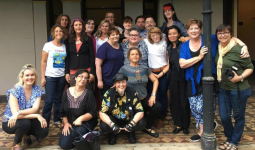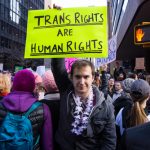Global Calls to Stop “Normalisation” Surgery on Intersex Children

US-based organisations Human Rights Watch and interACT released a report on Tuesday, calling for the end to the practice of performing medically unnecessary “normalisation” surgeries on intersex children in the United States.
Intersex people are born with physical sex characteristics that are more diverse than the typical binary notions of male or female. Intersex traits are natural manifestations of biological diversity, which for some are recognisable at birth, while for others emerge later in life.
An estimated 1.7 percent of the population are intersex.
A devastating decades-old practice
Since the 1960s, “normalisation” surgery has been performed upon intersex children around the world. These often merely cosmetic procedures are carried out with the aim of surgically assigning the sex of male or female to children with diverse traits.
As the US report points out, the long-term consequences of this surgery are devastating. An individual can grow up with a gender identity that doesn’t match the outcome of the surgery. They can suffer from a loss of a sense of bodily autonomy, and can lose sexual function.
Currently, the American Medical Association is considering a policy of urging doctors to defer carrying out these procedures on youths except under “life-threatening circumstances.” And in June, three former US surgeons general said the practice is unjustified and should be stopped.
The Australian setting
Morgan Carpenter, co-executive director of Organisation Intersex International Australia (OIIAU), said that at present in this country, there’s “no transparency” about what’s actually occurring in hospitals, as well as no reliable statistical information that reflects it.
“What staff of hospitals tell the media and what is reported to the Australian Institute of Health and Welfare do not match,” Morgan told Sydney Criminal Lawyers®. And went on to explain that it’s unclear as to what governments know about what is happening in hospitals.
However, according to Morgan, “OIIAU is aware of much of what goes on.” This is via confidential information gathered from families and friends, as well as “from talking off-the-record with clinicians about their practices and their rationales for intervention.”
The practice of “normalisation” surgery on adolescents and teens still continues in Australia. Performed without fully informed consent, these procedures – that are designed to make children conform to social norms – can often result in the sterilisation of individuals.
Morgan pointed out that a “2015 Australian survey of 272 people born with atypical sex characteristics showed that 18 percent failed to complete secondary school.” And a major cause was the effects of medical interventions during puberty, along with stigma and bullying.
It was also found that the majority of participants in the survey had experienced two medical interventions prior to the age of 18.
Australian legal precedents
In January last year, Carla’s case went before the Family Court of Australia. The parents of five-year-old Carla were seeking an order to allow them to authorise their child to undergo a medical procedure that would result in sterilisation.
Carla had already undergone cosmetic surgery in the past. And the parents had the support of medical experts for the further procedures.
During proceedings, the Family Court referred to Marian’s case, which went before the High Court of Australia in 1992. The case involved Marion: a 14-year-old girl with intellectual disability. Her parents wanted her to undergo a surgical procedure that would sterilise her.
The High Court made a distinction between therapeutic and non-therapeutic medical procedures. It ruled that parents cannot authorise consent to a non-therapeutic procedure like the sterilisation of a child, and that it may only take place if a court permits it.
On January 20 last year, Carla’s parents were given permission to authorise the surgery. In handing down his decision, Justice Forrest said that applying to the court for such a sanction was “a prudent step,” however, he didn’t think it was “actually required.”
The decision and the judge’s remarks outraged the intersex community.
Recommendations ignored
In October 2013, the Senate Community Affairs References Committee inquiry into involuntary or coerced sterilisation of intersex people in Australia delivered its second report.
Among its recommendations, the inquiry proposed that surgery be deferred until a person can give “fully informed consent,” as well as that governments and organisations discontinue using the term “disorders of sexual development.”
Intersex rights activists point out that the continued use of the term “disorders of sexual development” leads to the perpetuation of the notion that intersex characteristics need to be corrected, and that surgery is a way to “fix” them.
However, despite the committee’s recommendations the Australian government announced in May this year that it won’t be implementing them, according to Dean Price, advocacy project manager of People with Disability Australia.
International condemnation
In 2013, the United Nations Special Rapporteur on torture Juan E Méndez condemned “normalisation” procedures in a report. Mr Méndez called on all nations to prohibit these “intrusive and irreversible treatments,” and to provide special protection to marginalised individuals.
While in April 2015, Malta become the first country in the world to outlaw the practice of conducting unnecessary medical interventions on minors with intersex variations. The law recognises the right to bodily integrity and physical autonomy.
The Darlington Statement
The OIIAU recently submitted a shadow report to the UN Committee on the Rights of Persons with Disabilities. The report calls on the committee to ask the Australian government to put a halt to these ongoing “human rights abuses.”
The recommendations in the report are based on the Darlington Statement, which was produced by a number of Australian and New Zealand intersex organisations and advocates in March this year. The statement was cited in the US report released on Tuesday.
The priorities of the intersex human rights movement are set out in the statement, which include the “immediate prohibition as a criminal act of deferrable medical interventions,” and to end legal classification systems that uphold “sex and gender binaries.”
Intersex people have existed in all societies and cultures throughout history, and it’s a grave injustice that the medical profession continues to try and surgically make intersex people normal, rather than recognising that they already are.







